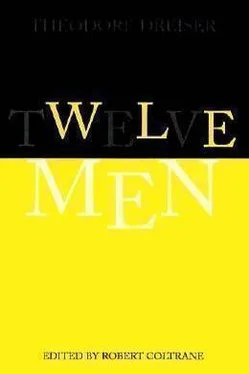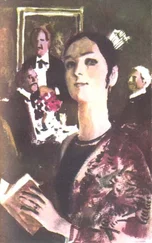Теодор Драйзер - Twelve Men
Здесь есть возможность читать онлайн «Теодор Драйзер - Twelve Men» весь текст электронной книги совершенно бесплатно (целиком полную версию без сокращений). В некоторых случаях можно слушать аудио, скачать через торрент в формате fb2 и присутствует краткое содержание. Год выпуска: 2014, Издательство: epubBooks Classics, Жанр: Биографии и Мемуары, на английском языке. Описание произведения, (предисловие) а так же отзывы посетителей доступны на портале библиотеки ЛибКат.
- Название:Twelve Men
- Автор:
- Издательство:epubBooks Classics
- Жанр:
- Год:2014
- ISBN:нет данных
- Рейтинг книги:4 / 5. Голосов: 1
-
Избранное:Добавить в избранное
- Отзывы:
-
Ваша оценка:
- 80
- 1
- 2
- 3
- 4
- 5
Twelve Men: краткое содержание, описание и аннотация
Предлагаем к чтению аннотацию, описание, краткое содержание или предисловие (зависит от того, что написал сам автор книги «Twelve Men»). Если вы не нашли необходимую информацию о книге — напишите в комментариях, мы постараемся отыскать её.
Twelve Men — читать онлайн бесплатно полную книгу (весь текст) целиком
Ниже представлен текст книги, разбитый по страницам. Система сохранения места последней прочитанной страницы, позволяет с удобством читать онлайн бесплатно книгу «Twelve Men», без необходимости каждый раз заново искать на чём Вы остановились. Поставьте закладку, и сможете в любой момент перейти на страницу, на которой закончили чтение.
Интервал:
Закладка:
I still protested weakly, but in vain. His affection was so overwhelming and tender that it made me weak. I allowed him to help me get my things together. Then he paid the bill, a small one, and on the way to the hotel insisted on forcing a roll of bills on me, all that he had with him. I was compelled at once, that same day or the next, to indulge in a suit, hat, shoes, underwear, all that I needed. A bedroom adjoining his suite at the hotel was taken, and for two days I lived there, later accompanying him in his car to a famous sanitarium in Westchester, one in charge of an old friend of his, a well–known ex–wrestler whose fame for this sort of work was great. Here I was booked for six weeks, all expenses paid, until I should "be on my feet again," as he expressed it. Then he left, only to visit and revisit me until I returned to the city, fairly well restored in nerves if not in health.
But could one ever forget the mingled sadness and fervor of his original appeal, the actual distress written in his face, the unlimited generosity of his mood and deed as well as his unmerited self–denunciation? One pictures such tenderness and concern as existing between parents and children, but rarely between brothers. Here he was evincing the same thing, as soft as love itself, and he a man of years and some affairs and I an irritable, distrait and peevish soul.
Take note, ye men of satire and spleen. All men are not selfish or hard.
The final phase of course related to his untimely end. He was not quite fifty–five when he died, and with a slightly more rugged quality of mind he might have lasted to seventy. It was due really to the failure of his firm (internal dissensions and rivalries, in no way due to him, however, as I have been told) and what he foolishly deemed to be the end of his financial and social glory. His was one of those simple, confiding, non–hardy dispositions, warm and colorful but intensely sensitive, easily and even fatally chilled by the icy blasts of human difficulty, however slight. You have no doubt seen some animals, cats, dogs, birds, of an especially affectionate nature, which when translated to a strange or unfriendly climate soon droop and die. They have no spiritual resources wherewith to contemplate what they do not understand or know. Now his friends would leave him. Now that bright world of which he had been a part would know him no more. It was pathetic, really. He emanated a kind of fear. Depression and even despair seemed to hang about him like a cloak. He could not shake it off. And yet, literally, in his case there was nothing to fear, if he had only known.
And yet two years before he did die, I knew he would. Fantastic as it may seem, to be shut out from that bright world of which he deemed himself an essential figure was all but unendurable. He had no ready money now—not the same amount anyhow. He could not greet his old–time friends so gayly, entertain so freely. Meeting him on Broadway shortly after the failure and asking after his affairs, he talked of going into business for himself as a publisher, but I realized that he could not. He had neither the ability nor the talent for that, nor the heart. He was not a business man but a song–writer and actor, had never been anything but that. He tried in this new situation to write songs, but he could not. They were too morbid. What he needed was some one to buoy him up, a manager, a strong confidant of some kind, some one who would have taken his affairs in hand and shown him what to do. As it was he had no one. His friends, like winter–frightened birds, had already departed. Personally, I was in no position to do anything at the time, being more or less depressed myself and but slowly emerging from difficulties which had held me for a number of years.
About a year or so after he failed my sister E― announced that Paul had been there and that he was coming to live with her. He could not pay so much then, being involved with all sorts of examinations of one kind and another, but neither did he have to. Her memory was not short; she gave him the fullness of her home. A few months later he was ostensibly connected with another publishing house, but by then he was feeling so poorly physically and was finding consolation probably in some drinking and the caresses of those feminine friends who have, alas, only caresses to offer. A little later I met a doctor who said, "Paul cannot live. He has pernicious anæmia. He is breaking down inside and doesn't know it. He can't last long. He's too depressed." I knew it was so and what the remedy was—money and success once more, the petty pettings and flattery of that little world of which he had been a part but which now was no more for him. Of all those who had been so lavish in their greetings and companionship earlier in his life, scarcely one, so far as I could make out, found him in that retired world to which he was forced. One or two pegged–out actors sought him and borrowed a little of the little that he had; a few others came when he had nothing at all. His partners, quarreling among themselves and feeling that they had done him an injustice, remained religiously away. He found, as he often told my sister, broken horse–shoes (a "bad sign"), met cross–eyed women, another "bad sign," was pursued apparently by the inimical number thirteen—and all these little straws depressed him horribly. Finally, being no longer strong enough to be about, he took to his bed and remained there days at a time, feeling well while in bed but weak when up. For a little while he would go "downtown" to see this, that and the other person, but would soon return. One day on coming back home he found one of his hats lying on his bed, accidentally put there by one of the children, and according to my sister, who was present at the time, he was all but petrified by the sight of it. To him it was the death–sign. Some one had told him so not long before!!!
Then, not incuriously, seeing the affectional tie that had always held us, he wanted to see me every day. He had a desire to talk to me about his early life, the romance of it—maybe I could write a story some time, tell something about him! (Best of brothers, here it is, a thin little flower to lay at your feet!) To please him I made notes, although I knew most of it. On these occasions he was always his old self, full of ridiculous stories, quips and slight mots , all in his old and best vein. He would soon be himself, he now insisted.
Then one evening in late November, before I had time to call upon him (I lived about a mile away), a hurry–call came from E―. He had suddenly died at five in the afternoon; a blood–vessel had burst in the head. When I arrived he was already cold in death, his soft hands folded over his chest, his face turned to one side on the pillow, that indescribable sweetness of expression about the eyes and mouth—the empty shell of the beetle. There were tears, a band of reporters from the papers, the next day obituary news articles, and after that a host of friends and flowers, flowers, flowers. It is amazing what satisfaction the average mind takes in standardized floral forms—broken columns and gates ajar!
Being ostensibly a Catholic, a Catholic sister–in–law and other relatives insistently arranged for a solemn high requiem mass at the church of one of his favorite rectors. All Broadway was there, more flowers, his latest song read from the altar. Then there was a carriage procession to a distant Catholic graveyard somewhere, his friend, the rector of the church, officiating at the grave. It was so cold and dreary there, horrible. Later on he was removed to Chicago.
But still I think of him as not there or anywhere in the realm of space, but on Broadway between Twenty–ninth and Forty–second Streets, the spring and summer time at hand, the doors of the grills and bars of the hotels open, the rout of actors and actresses ambling to and fro, his own delicious presence dressed in his best, his "funny" stories, his songs being ground out by the hand organs, his friends extending their hands, clapping him on the shoulder, cackling over the latest idle yarn.
Читать дальшеИнтервал:
Закладка:
Похожие книги на «Twelve Men»
Представляем Вашему вниманию похожие книги на «Twelve Men» списком для выбора. Мы отобрали схожую по названию и смыслу литературу в надежде предоставить читателям больше вариантов отыскать новые, интересные, ещё непрочитанные произведения.
Обсуждение, отзывы о книге «Twelve Men» и просто собственные мнения читателей. Оставьте ваши комментарии, напишите, что Вы думаете о произведении, его смысле или главных героях. Укажите что конкретно понравилось, а что нет, и почему Вы так считаете.









